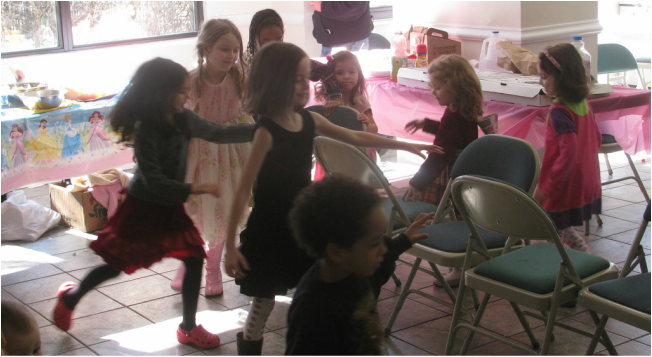Thanks to Helicopter Parents and The Self-Esteem Movement, Schools Have Banned Musical Chairs.5/12/2016
Psychologists have been studying play behavior in children for a hundred years. The importance of play -- including rough-and-tumble play -- is undeniable.
Yet misguided educators have decided that musical chairs isn't appropriate for kids, anymore, and you won't believe why.
In a recent YourTango post, I wrote:
According to Christina Hoff Sommers, philosophy professor and author of How the Helping Culture is Eroding Self-Reliance, it's because:
And it's like, okay. Meditation is good for kids -- in moderation. But literally a hundred years of research show that competitive and physical play are an essential part of kids' development. But but but... What about their self-esteem, the well-meaning-but-harmful helicopter parents might ask? Well, so here's the thing: Aggression, competition and losing don't actually hurt a child's self-esteem. But they do teach children valuable coping and resilience skills. The post explains: You may think you're helping your child out by insulating them from social rejection, embarrassment or hurt feelings as long as possible. But the truth is, you're emotionally crippling them. Resilience isn't something that magically happens once you turn a certain age. It's something you develop by dealing with the small disappointment of being the first kid eliminated from musical chairs or the last kid picked in the kickball game. Determination isn't something that happens automatically. It's something you develop by being disappointed by a certain result, and vowing to practice, improve and do better next time. And here's the other thing: There is no research that shows there is any benefit to "teaching" a child self-esteem. According to Roy F. Baumeister et al.'s 2003 meta-analysis, Does High Self-Esteem Cause Better Performance, Interpersonal Success, Happiness or Healthier Lifestyles, There is no relationship between high self-worth and achievement. High self-regard is commonly found in narcissists, bullies and sociopaths. People with high, unwarranted self-esteem often have an inflated sense of popularity and likability. They get hostile when criticized or rejected. They alienate others. Teaching self-esteem could be setting your child up for a lifetime of loneliness and failed relationships. Self-esteem might make your child happier. But there is no research that shows a causal relationship between happiness and self-esteem. And here's the last thing: Competitive, rough-and-tumble play helps kids develop both gross motor skills and proprioceptive sense, or the sense of relative position of your different body and the strength and effort being employed in movement. (It's how basketball players manage to shoot a gentle layup while running full-speed down the court, or even just how kids manage to play tag without pummeling each other.) If you are a teacher or a parent, keep this in mind. Competition and physicality -- winning and losing -- are super crucial for healthy child development. I know there's pressure to be all wishy washy and stuff. But don't cave in. Be skeptical. Be smart. Protect your child from overprotection. *** Want to know more? Check out:
1 Comment
10/20/2016 10:22:51 am
When flying your best RC helicopters for the first time, you should start off by focusing on one control stick until you master it and then work the two of them as you continue to gain confidence. After you have learned the basics of flying the helicopter, you can then start to play around with some old tricks like the figure 8, which is a classic and requires that you learn how to fly the helicopter in any direction regardless of where it is facing.
Reply
Leave a Reply. |
About the Author

Eva is a content specialist with a passion for play, travel... and a little bit of girl power. Read more >
Want to support The Happy Talent? CLICK HERE!
Or Find me on Patreon!
What's Popular on The Happy Talent:
Trending in Dating and Relationships:
What's Popular in Science: Playfulness and Leisure Skills:
Popular in Psychology and Social Skills:
Categories
All
|































 RSS Feed
RSS Feed